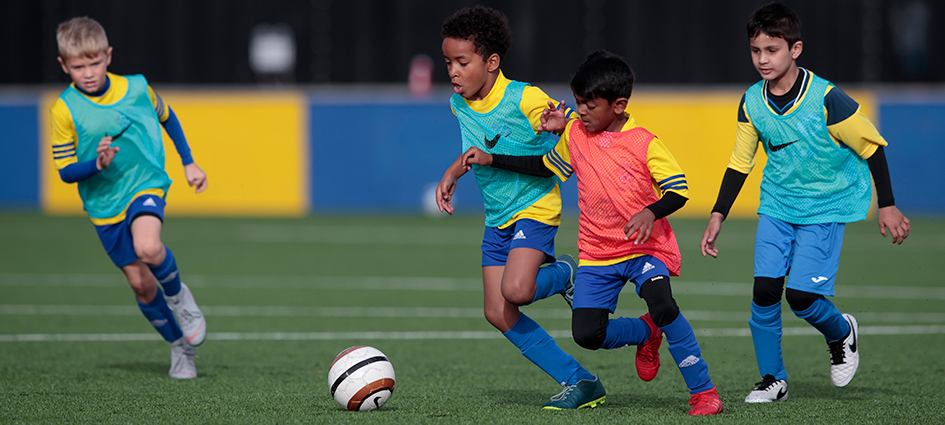Guides

Intelligent defending
- The Boot Room
- 06 January 2020
Intelligent defending is another vital ingredient for the modern-day player, and young players can be encouraged to develop the qualities needed to become an intelligent defender over time.
In order to become an intelligent defender, Foundation Phase players need to:
- be difficult to beat
- win the ball cleanly
- avoid kicking the ball out if at all possible.
The older players in the Foundation Phase will have a wealth of training and games to refer back to, meaning they’ve encountered lots of different situations and have probably worked out what they need to do to be successful in each one. The youngest players will not have these reference points, so they’ll need to be developed slowly over time.
In their U5-8 development, the messages about “being difficult to beat” and “winning the ball cleanly” will have been communicated and these must continue. They’re clear, simple and easy to think about and to develop.
When playing the many small-sided games that the DNA advocates, you can help by encouraging the players to look around and scan the area nearby. Once they’re beginning to look around, the priority is to help them identify the most important things.
Your youngest players may not know which bit of information is important though, so the first thing to do is to help them notice players who are moving into dangerous positions. You can also remind them to keep an eye on where the ball is but to ‘notice’ other things as well - even if it’s just: “Jake has the ball and he’s fast”.
It’s easy to assume that your young players will automatically do these things, but they may not. This is where they need your support and guidance as you can scaffold their learning and raise their awareness of things other than the ball. Developmentally this is a big step, so be patient.
Some of your older players (9-12) may come with a growing understanding of their defensive duties, but others may not. Chronological age is no indicator of understanding so help each player appropriately and avoid thinking that they must know about this if they’re that age.
To help develop your players’ defensive abilities, you can play games where interceptions are rewarded, as this is a good way to introduce the idea of anticipation and the reading of visual cues. Just remember to keep it simple and age appropriate.
Playing small-sided games is a great way to improve game understanding, so make sure you provide lots of them – and within them; help with some really clear and simple defending ideas.
A defender who knows when to hold their position or move out to address a dangerous situation (or help to create one for their team) is a real asset.
Young players should be encouraged to ‘join or support the attack’ and as each season passes by, your players will develop an understanding of risk, safety and danger. However, it’s important to avoid instilling a fearful approach to defending.
Help players feel confident in their ability because they know they’re good at getting the ball and also have a clear idea of what to do next.
The out of possession aspect of the game is a very important one, but for the England DNA it’s a slower process over a number of years. Your approach should be to make defending enjoyable and this can come from allowing the player to do something exciting with the ball once they have won it ‘cleanly’. This is a great starting point.
To summarise:
- Play lots of small-sided games to accelerate game understanding and to introduce the situations that frequently occur – help the players ‘notice’ things and try to catch them doing the right things.
- Encourage players to begin to scan (play games where they have to look away from the ball and notice other things).
- Allow players to join the attacks and recover – this is great for motivation and physical literacy. Include transition phases in your games to replicate the changes from defence to attack and give a purpose once the ball has been ‘cleanly’ won.
- Notice good positional play, patience and resilience when a player is defending.
Remember, developing intelligent defending relies on the coach noticing good positional or tactical decisions made by their players and then reinforcing them appropriately.
To learn more about Foundation Phase DNA, click here.

























